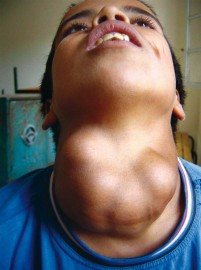
According to some researchers, there is an increasing number of Filipinos having goiter and 90 percent of Goiter’s cases worldwide is caused by iodine deficiency. A Goitre or Goiter is an abnormal enlargement of the thyroid and this can become very big which can be seen easily as a m(–foul word(s) removed–) in the neck. This type of disorder is most common to women but men are not exempted.
Some common risk factors for goiter include:
- A lack of dietary iodine. Group of people who are living in areas where iodine supply is short and who don’t have access to iodine supplements are at high risk of goiter.
- Your sex. Since women are more prone to have thyroid disorders, so they are also more likely to develop goiters.
- Your age. Chances of developing a goiter increases as the age of the person increase.
- Medical history. A family or personal history of autoimmune disease increases the risk for having goiter.
- Pregnancy and menopause. Since thyroid problems are more likely to occur during pregnancy and menopause, so women are more likely to develop goiters.
- Certain medications. Some of the medications that we are taking, including immunosuppressants, antiretrovirals, the heart drug amiodarone (Cordarone, Pacerone, others) and the psychiatric drug lithium (Eskalith, Lithobid, others), increases the risk of having goiter. .
- Radiation exposure. Risk of having this disorder increases if we often undergo radiation treatments to our neck or chest area or we have been exposed to radiation in a nuclear facility, test or accident.
The common signs and symptoms of Goiter are the following: tight feeling in the throat, difficulty of breathing, coughing, hoarseness, difficulty of swallowing, and a visible swelling at the base of our neck that may be particularly obvious.
Treatment for Goiter depends on the size of the goiter, the signs and symptoms, and the underlying cause. Usually the doctor may recommend:
- Observation. If the goiter is small, does not cause any problems, and the thyroid is functioning normally, then the doctor may suggest the “WAIT-AND-SEE APPROACH”.
- Medications. If the patient has hypothyroidism, then thyroid hormone replacement with levothyroxine (Levothroid, Synthroid) will resolve the symptoms of this. The thyroid hormone replacement slows down the release of thyroid-stimulating hormone from the pituitary gland which helps by decreasing the size of the goiter. For inflammation of the thyroid gland, aspirin or a corticosteroid medication is being suggested by the doctor to treat the inflammation. However, goiters (–foul word(s) removed–)ociated with hyperthyroidism, need medications to normalize hormone levels.
- Surgery. This is an option for those who have large goiter that is uncomfortable or causes difficulty breathing or swallowing to the patient. It may remove the entire thyroid gland or just a part of it. Surgery is also the treatment for thyroid cancer.
- Radioactive iodine. This is taken orally to treat an overactive thyroid gland. It diminishes size of the goiter, but eventually may also cause an underactive thyroid gland. So, they need to take levothyroxine for life.
Some say that prevention is better than cure. So, to prevent from having Goiter we must get enough iodine; we can use iodized salt or eat seafood or seaweed. However, if the excess iodine intake is the cause of Goiter although it is very seldom to happen Awe must reduce iodine consumption.
Let us remember that “Health Is Wealth”.
